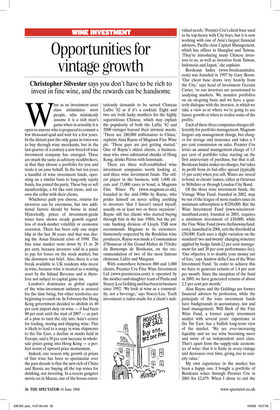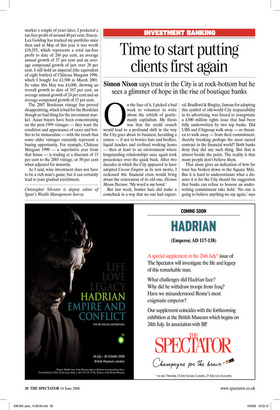Opportunities for vintage growth
Christopher Silvester says you don’t have to be rich to invest in fine wine, and the rewards can be handsome Wine as an investment asset class intimidates most people, who mistakenly assume it is a rich man’s game when in actuality it is open to anyone who is prepared to commit a few thousand quid and wait for a few years. In the distant past the only game in town was to buy through wine merchants, but in the last quarter of a century a new breed of wine investment company has emerged. These are much the same as advisory stockbrokers, in that they choose a portfolio for you and trade it on your behalf. In the last ten years a handful of wine investment funds, operating on a similar basis to long-only equity funds, has joined the party. These buy or sell memberships, a bit like unit trusts, and coown the cellar with their clients.
Whichever path you choose, returns for investors can be enormous, but two additional factors should be borne in mind. Historically, prices of investment-grade wines have shown steady growth regardless of stock-market volatility or economic recession. There has been only one major blip in the last 30 years and that was during the Asian financial crisis of 1998. The fine wine market went down by 15 to 20 per cent, because investors sold in a panic to pay for losses on the stock market, but the downturn was brief. Also, there is a tax break available to UK residents who invest in wine, because wine is treated as a wasting asset by the Inland Revenue and is therefore not subject to capital gains tax.
London’s dominance as global capital of the wine-investment industry is assured for the time being, but other territories are beginning to catch on. In February the Hong Kong government decided to abolish its 40 per cent import duty on wine — it had been 80 per cent until the start of 2007 — as part of a plan to turn the city into Asia’s centre for trading, storing and shipping wine. This is likely to lead to a surge in wine shipments to the Far East, a decline in stocks held in Europe, and a 30 per cent increase in wholesale prices going into Hong Kong — a perfect storm of upward price momentum.
Indeed, one reason why growth in prices of fine wine has been so spectacular over the past decade is that the new rich of China and Russia are buying all the top wines for drinking, not investing. In a recent gangster movie set in Macau, one of the bosses osten tatiously demands to be served Chateau Lafite ’82 as if it’s a cocktail. Eight and two are both lucky numbers for the highly superstitious Chinese, which may explain the popularity of both the Lafite ’82 and 2000 vintages beyond their intrinsic merits. ‘There are 280,000 millionaires in China,’ explains Alan Rayne of Magnum Fine Wine plc. ‘These guys are just getting started.’ One of Rayne’s oldest clients, a businessman who owns substantial chunks of Hong Kong, drinks Pétrus with lemonade.
There are three well-established wine investment companies worth looking at, and three wine investment funds. The oldest player in the business, with 1,000 clients and 15,000 cases in bond, is Magnum Fine Wines Plc (www.magnum.co.uk), founded in the mid-1980s by Rayne, who prides himself on never selling anything to investors ‘that I haven’t tasted myself, usually on at least two or three occasions’. Rayne still has clients who started buying through him in the late 1980s, but the private banking division of Lloyds TSB now recommends Magnum to its customers. Immensely respected by the Bordelais wine producers, Rayne was made a Commandeur d’Honneur of the Grand-Maître de l’Ordre du Bontemps de Bordeaux, on the recommendation of two of the most famous chateaux, Lafite and Margaux.
With somewhere between 800 and 1,000 clients, Premier Cru Fine Wine Investment Ltd (www.premiercru.com) is operated by the mother-and-daughter team of Paula and Stacey-Lea Golding and has been in business since 1992. ‘We look at wine as a commodity, not a beverage,’ says Stacey-Lea. ‘Each investment is tailor-made for a client’s indi vidual needs.’ Premier Cru’s client base used to be top-heavy with City boys, but it is now working with one of Asia’s largest financial advisers, Pacific-Asia Capital Management, which has offices in Shanghai and Taiwan. ‘They’re introducing many Chinese investors to us, as well as investors from Taiwan, Indonesia and Japan,’ she explains.
Bordeaux Index (www.bordeauxindex. com) was founded in 1997 by Gary Boom. ‘Our client base draws very heavily from the City,’ says head of investment Geraint Carter, ‘so our investors are accustomed to analysing markets. We monitor portfolios on an on-going basis and we have a quarterly dialogue with the investor, in which we take a view as to where we’re going to see future growth or when to realise some of the profits.’ Each of these three companies charges differently for portfolio management. Magnum forgoes any management charge, but charges for storage and insurance and takes a 5 per cent commission on sales. Premier Cru levies an annual management charge of 1.5 per cent of portfolio value starting on the first anniversary of purchase, but that is all. Bordeaux Index makes no charges, but takes its profit from its bid-offer spread (typically 15 per cent) when you sell. Wines are stored in bond, in clients’ names, either at Octavian in Wiltshire or through London City Bond.
Of the three wine investment funds, the Vintage Wine Fund, founded in 2002, may be out of the league of most readers since its minimum subscription is €250,000. But the Wine Investment Fund (www.wineinvestmentfund.com), founded in 2003, requires a minimum investment of £10,000, while the Fine Wine Fund (www.thefinewinefund. com), launched in 2006, sets the threshold at £50,000. Each uses a slight variation on the standard ‘two and twenty’ charging structure applied by hedge funds (2 per cent management fee and 20 per cent performance fee). ‘Our objective is to double your money net of fees,’ says Andrew della Casa of the Wine Investment Fund. ‘In order to achieve this we have to generate returns of 1.4 per cent per month. Since the inception of the fund in 2003, we have generated returns of about 2.5 per cent per month.’ Alan Rayne and the Goldings are former financial advisers by profession, while the principals of the wine investment funds have backgrounds in accountancy, law and fund management. Will Beck of the Fine Wine Fund, a former equity investment analyst with several years’ experience in the Far East, has a bullish long-term view of the market. ‘We see ever-increasing liquidity and we see wine becoming more and more of an independent asset class. That’s apart from the supply-side economics of wine: that it is finite in every vintage and decreases over time, giving rise to scarcity value.’ My own experience in the market has been a happy one. I bought a portfolio of Bordeaux wines through Premier Cru in 2001 for £2,879. When I chose to exit the market a couple of years later, I pocketed a tax-free profit of around 40 per cent. StaceyLea Golding has tracked my portfolio since then and in May of this year it was worth £10,355, which represents a total tax-free profit to date of 260 per cent, an average annual growth of 37 per cent and an average compound growth of just over 20 per cent. I still hold an imperial (the equivalent of eight bottles) of Château Margaux 1996, which I bought for £1,500 in March 2001. Its value this May was £4,000, showing an overall growth to date of 167 per cent, an average annual growth of 24 per cent and an average compound growth of 15 per cent.
The 2007 Bordeaux vintage has proved disappointing, which is bad for the Bordelais though no bad thing for the investment market. Asian buyers have been concentrating on the post-1999 vintages — they want the condition and appearance of cases and bottles to be immaculate — with the result that some older vintages currently represent a buying opportunity. For example, Château Margaux 1990 — a superlative year from that house — is trading at a discount of 15 per cent to the 2005 vintage, or 50 per cent when adjusted for maturity.
As I said, wine investment does not have to be a rich man’s game; but it can certainly lead to your gradual enrichment.



















































































 Previous page
Previous page